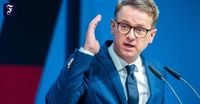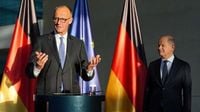In a historic election marked by tension and uncertainty, Friedrich Merz of the Christian Democratic Union (CDU) has been elected as Germany's new Chancellor, albeit after a rocky start that saw him fail to secure enough votes in the first round. The election, which took place on May 6, 2025, saw Merz triumph in a second ballot, garnering 325 votes necessary to assume the chancellorship.
Merz, 69, faced an unexpected setback during the initial voting, receiving six votes fewer than required. This initial failure was particularly poignant for his family, who were present to witness the event. His wife, Charlotte Merz, along with their daughters Constanze and Carola, sat in the Bundestag, dressed in blue outfits, while their son Philippe was notably absent from the occasion.
Following his election, Merz expressed relief and a sense of normalcy, stating, "It is normal that not everyone agrees," during an interview with ARD. He emphasized the importance of trust within the coalition government comprising the CDU, CSU, and SPD, despite the rocky start. The election's aftermath has sparked a range of international reactions, underscoring the implications of his leadership for Germany and beyond.
The Kremlin was quick to comment on the election, with spokeswoman Marija Sacharowa stating that Germany has lost significant sovereignty and authority in international affairs, making the change in leadership less impactful. She further indicated that no improvement in diplomatic relations with Russia is anticipated due to the ongoing anti-Russian sentiments expressed by German politicians.
International media outlets have also weighed in on Merz's election. The Financial Times described the first round of voting as a blow to Merz's authority, noting the challenges he will face as he attempts to reform Europe’s largest economy amid political turmoil. The paper highlighted that Merz's government relies on a fragile parliamentary majority, raising questions about his ability to govern effectively.
Meanwhile, the US news channel CNN characterized the election as a significant setback for Merz, framing it as another twist in a period of uncertainty for the nation. The New York Times echoed this sentiment, calling the first ballot a surprising and demoralizing setback that could disrupt Merz’s planned foreign engagements.
In a bid to solidify his position, Merz is set to embark on his first official trip to France, where he will meet with French President Emmanuel Macron. The meeting is expected to focus on how Europe can assert its independence following the radical shifts in US foreign policy under President Donald Trump. The French daily Le Monde noted a palpable impatience between the two leaders, suggesting that both aim to make a significant impact during their tenure.
In addition to his discussions with Macron, Merz will also travel to Poland to meet with Prime Minister Donald Tusk. The agenda will likely include discussions on the ongoing Russian aggression in Ukraine and issues surrounding irregular migration, reflecting the pressing concerns facing Europe today.
Merz's leadership style has drawn mixed reactions. While some have praised his commitment to transatlantic relations, others have raised concerns about his past radical statements, which some within his conservative base found too extreme. The Guardian noted that Merz's collaboration with the far-right Alternative for Germany (AfD) party has raised alarms about the stability of Germany's political landscape.
Despite the challenges ahead, Merz's family remains a source of support. His wife Charlotte, who is a judge and director of the Arnsberg District Court, has been a steadfast partner throughout his political journey. The couple met during their law studies in Bonn and married shortly thereafter. They have three children, all of whom are pursuing successful careers in various fields, including medicine and law.
Reflecting on his motivations for returning to politics, Merz stated in a previous interview that he is driven by a desire to create a better future for his children and grandchildren. His wife echoed this sentiment, emphasizing their responsibility to ensure a sustainable environment for future generations.
As Merz navigates the complexities of his new role, he will need to address not only domestic challenges but also the expectations of the international community. The coming weeks will be critical as he seeks to establish his authority and chart a course for Germany amidst a landscape fraught with uncertainty.
In the wake of his election, Merz has already indicated plans to reach out to US President Donald Trump, aiming to foster a constructive dialogue that respects Germany's domestic politics. The US State Department has expressed its willingness to collaborate with Merz's government to ensure the security of both nations.
As Merz embarks on this new chapter, he faces a daunting task ahead. The support of his coalition partners and the broader political landscape will be crucial in determining the success of his administration. His ability to unite various factions within the Bundestag and respond effectively to pressing issues will be closely scrutinized, both at home and abroad.





